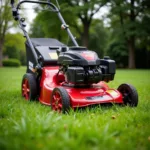A car mechanic’s toolbox is their sanctuary, filled with the basic tools for car mechanic that enable them to diagnose, repair, and maintain vehicles. From simple oil changes to complex engine overhauls, having the right tools is paramount. This guide explores the must-have basic tools for car mechanic, providing insights into their uses and importance. We’ll cover everything from wrenches and screwdrivers to diagnostic equipment, empowering you to build a comprehensive and effective toolkit.
Essential Hand Tools Every Car Mechanic Needs
Every car mechanic, whether a seasoned professional or a DIY enthusiast, needs a core set of hand tools. These are the foundational instruments for tackling common automotive tasks.
- Wrench Set: A comprehensive wrench set, including both metric and SAE sizes, is crucial. Combination wrenches, offering both open and closed ends, are particularly versatile. Wrenches are used for tightening and loosening nuts and bolts, a fundamental aspect of most car repairs.
- Screwdriver Set: A diverse set of screwdrivers, including Phillips, flathead, and Torx, is essential for removing screws of various types found throughout a vehicle. Having different sizes within each type is important for compatibility with different screw heads.
- Pliers: Various types of pliers, such as slip-joint, needle-nose, and locking pliers, provide gripping and manipulating capabilities for a range of tasks, from holding components to removing fasteners.
- Sockets and Ratchet: A socket set with a variety of sizes and drive types (1/4″, 3/8″, 1/2″) is invaluable for working with nuts and bolts in tight spaces. The ratchet allows for quick and efficient fastening and unfastening.
- Hammer: A mechanic’s hammer is useful for a variety of tasks, from tapping parts into place to persuading stubborn components to move.
Stepping Up Your Game: Advanced Tools for Diagnostics and Repair
Beyond the basic hand tools, investing in more advanced equipment can significantly enhance your diagnostic and repair capabilities.
Diagnostic Tools: Unveiling the Secrets of Your Car
- OBD-II Scanner: An OBD-II (On-Board Diagnostics) scanner is indispensable for retrieving diagnostic trouble codes (DTCs) from a vehicle’s computer, providing insights into the root cause of malfunctions. Modern scanners offer advanced features like live data streaming and freeze-frame data.
- Multimeter: A multimeter measures voltage, current, and resistance, allowing you to test electrical circuits and components, diagnosing issues with wiring, sensors, and other electrical systems.
Specialized Tools: Tackling Specific Repairs
- Torque Wrench: A torque wrench ensures that fasteners are tightened to the correct specifications, preventing damage to components and ensuring proper operation. This is critical for engine work and other sensitive assemblies.
- Brake Bleeder Kit: A brake bleeder kit allows for proper bleeding of the brake system, removing air bubbles and ensuring optimal braking performance.
Why Investing in Quality Tools is Crucial
Investing in high-quality basic tools for car mechanic is essential for several reasons:
- Durability and Longevity: Quality tools are built to withstand the rigors of automotive work, lasting longer and providing reliable performance.
- Safety: Well-designed tools enhance safety by reducing the risk of slippage or breakage during use.
- Efficiency: Using the right tool for the job makes tasks easier and faster, improving overall efficiency.
“Investing in the right tools is an investment in your success as a mechanic,” says renowned automotive expert, Robert Johnson. “It’s not just about getting the job done; it’s about doing it right, efficiently, and safely.”
Conclusion: Building Your Automotive Arsenal
Having the right basic tools for car mechanic is fundamental for any automotive enthusiast or professional. From simple maintenance tasks to complex repairs, a well-equipped toolbox empowers you to tackle challenges with confidence and efficiency. By investing in quality tools and understanding their proper use, you lay the foundation for a successful and rewarding automotive journey. Remember, having the correct basic tools for car mechanic is not just about fixing cars; it’s about mastering the art of automotive care.
inspire uplift car high pressure cleaning tool amazon
FAQ
- What are the most basic tools for a car mechanic? A basic set should include wrenches, screwdrivers, pliers, sockets, a ratchet, and a hammer.
- Why is a torque wrench important? It ensures fasteners are tightened to the correct specification, preventing damage.
- What does an OBD-II scanner do? It retrieves diagnostic trouble codes from the car’s computer, helping pinpoint malfunctions.
- How do I choose quality tools? Look for durable materials, comfortable grips, and reputable brands.
- What other tools might I need as I gain experience? Specialized tools like brake bleeders and various pullers become important for more advanced repairs.
- Where can I find more information on specific tools? DiagFixPro offers comprehensive reviews and guides on various car mechanic tools.
- Is it worth investing in professional-grade tools for DIY repairs? While more expensive, they offer superior performance and durability, making them a worthwhile investment for frequent DIYers.
rado car high pressure cleaning tool amazon
“Having a comprehensive tool kit not only allows you to perform repairs efficiently but also gives you the confidence to tackle more challenging projects,” adds Sarah Miller, a seasoned mechanic with over 20 years of experience.
best selling high pressure car cleaning tool amazon
car high pressure cleaning tool amazon
For further assistance, please contact us via WhatsApp: +1(641)206-8880, Email: cardiagtechworkshop@gmail.com or visit our office at 910 Cedar Lane, Chicago, IL 60605, USA. Our customer service team is available 24/7.
